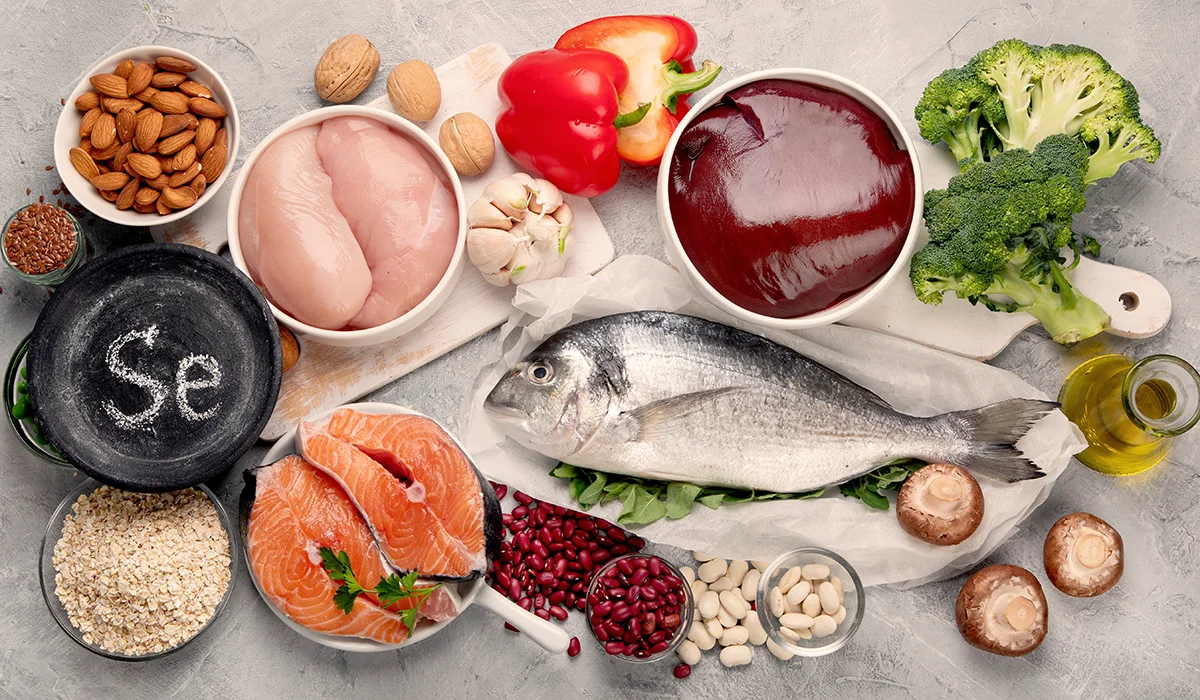A staggering 2 billion people worldwide don’t get enough iodine and selenium in their diet. These two minerals work together to support your thyroid function and keep your brain healthy. Understanding selenium benefits and what selenium is good for can significantly impact your overall health.
People often ask me about selenium and iodine supplements. They want to know the right daily doses and whether to take these minerals together. My research shows that combining these nutrients helps with weight control and brain function. Your overall health can benefit too. Let me show you five surprising ways these minerals can make you healthier, plus some simple tips you can use every day.
Understanding the Dynamic Duo: Iodine and Selenium
Let me share my knowledge about these amazing minerals that are significant for our well-being. The thyroid gland, the sort of thing I love to study, contains the highest concentration of both iodine and selenium compared to other organs in our body [1].
The essential role in human health
These minerals have distinct yet complementary roles in our body. Here’s what makes them special:
- Selenium powers 25 different enzymes (selenoproteins) that support:
- DNA synthesis
- Immune function
- Protection against oxidative damage
- Thyroid hormone metabolism [2]
Iodine is the fundamental building block for thyroid hormones T3 and T4, which control our metabolism, growth, and development [3].
How these minerals work together
The sort of thing I love is how these minerals create a perfect partnership in our bodies. Selenium-containing enzymes help convert the thyroid hormone T4 into its active form, T3 [4]. This interaction is vital because our body can’t properly use iodine without adequate selenium [4].
The thyroid gland actively stores both minerals, which demonstrates nature’s brilliant design for their cooperation [4]. These minerals protect our thyroid from oxidative damage during hormone production together [5].
Daily requirements for optimal health
Here are the daily requirements from my research:
For Iodine:
- Adults (19+ years): 150 micrograms daily
- Pregnant women: 220 micrograms daily
- Breastfeeding women: 290 micrograms daily [3]
For Selenium:
- Adults (14+ years): 55 micrograms daily
- Pregnant women: 60 micrograms daily
- Breastfeeding women: 70 micrograms daily [4]
The right balance matters – too much of either mineral can be just as problematic as too little [2]. People often ask me “should iodine and selenium be taken together?” These minerals work best as a team, but their intake needs careful balance.
It’s worth mentioning that selenium deficiency can worsen iodine deficiency, especially during pregnancy. Research shows that selenium deficiency links to pregnancy complications, including gestational diabetes and preterm birth [1].
Boosting Thyroid Function Naturally
My years of studying thyroid health have taught me a lot. The sort of thing i love is how selenium and iodine work together in our thyroid gland. Our thyroid contains the highest concentration of selenium per gram of tissue in our entire body [6].
Supporting hormone production
These minerals create a remarkable partnership in hormone production. Selenium-containing enzymes are vital for converting the thyroid hormone T4 into its active form T3 [7]. I tell my clients that iodine can become toxic in the body without enough selenium [8].
My research shows these key benefits for hormone production:
- Selenium protects thyroid cells from oxidative damage
- It makes safe iodine processing possible
- Both minerals support proper hormone synthesis
Regulating metabolism
My research shows these minerals are the foundations of a healthy metabolism. The conversion process of T4 into T3 controls our body’s metabolic rate directly [8]. Our metabolism slows down when selenium levels drop too low [8].
Preventing thyroid disorders
The way these minerals help prevent thyroid problems amazes me. Evidence shows that selenium supplementation can substantially reduce thyroid antibodies in autoimmune conditions [6]. Studies show that selenium deficiency links to several thyroid issues, including:
- Hashimoto’s thyroiditis
- Subclinical hypothyroidism
- Enlarged thyroid (goiter)
- Graves’ disease [9]
Research shows selenium supplementation improves thyroid ultrasound features and patient’s quality of life with autoimmune thyroid conditions [6]. Selenium helps protect against oxidative stress in the thyroid gland when combined with proper iodine levels [7].
My work shows that optimal levels of both minerals are significant. The European Thyroid Association now recommends selenium supplements for certain thyroid conditions [9]. This recommendation stands out because of their typically conservative approach to supplementation.
Enhancing Immune System Performance
My extensive research on immune health shows that selenium and iodine build a powerful shield for our immune system. These minerals work together to protect our bodies in remarkable ways, highlighting what selenium is good for beyond thyroid support.
Antioxidant properties and protection
The way these minerals act as our body’s natural defense system amazes me. Specialized proteins called selenoproteins help selenium protect our cells from oxidative damage [10]. Iodine adds to this protection by acting as an electron donor that neutralizes harmful free radicals which can damage our cell membranes [11].
These minerals create an impressive chain of antioxidant reactions:
- Selenium activates glutathione peroxidase, converting harmful hydrogen peroxide into harmless water
- Iodine improves total serum antioxidant status
- Together, they provide stronger protection against oxidative stress [12]
Fighting inflammation
Selenium plays a vital role in regulating inflammation. This mineral helps maintain the delicate balance between fighting infection and preventing excessive immune responses [13].
Research shows that selenium supplementation can:
- Reduce inflammatory markers
- Support balanced immune responses
- Help regulate chronic inflammation
- Protect against oxidative stress-related damage
The latest research reveals that selenium can influence the behavior of immune cells and direct them toward an anti-inflammatory state [5]. This mineral helps reduce pro-inflammatory substances like IL-1β and other inflammatory markers [5].
Supporting white blood cell function
Selenium proves especially important for white blood cell activity. A lack of selenium can affect the thymus, which produces vital immune cells like macrophages and lymphocytes [10].
These minerals support our immune cells in several ways:
- Selenium gets immune cells active and improves their response to harmful conditions [5]
- Iodine supports the innate immune system and balances immune responses [11]
- Together, they regulate both innate and adaptive immunity [5]
Selenium shares a unique relationship with immune cells of all types. It helps regulate natural killer cells and guides macrophages toward an anti-inflammatory state [5]. These benefits show up even in people who already have enough selenium in their system [5].
Our immune system’s interaction with these minerals stands out as remarkable. Iodine can modify human leukocytes to create balanced immune responses that promote and resolve inflammation when needed [11]. This dual action proves vital for keeping our immune system working at its best.
Supporting Cognitive Health
My research into brain health shows fascinating connections between cognitive function and these essential minerals. The statistics will surprise you – between 10% to 20% of people aged 65 and older show signs of mild cognitive impairment [14].
Brain development and function
My studies show that iodine is a vital part of brain development, especially when you have pregnancy and early childhood. The sort of thing I love to point out is how even mild iodine deficiency during pregnancy can affect children’s cognitive development. Studies show that children whose mothers had mild-to-moderate iodine deficiency during pregnancy scored lower on IQ tests and literacy assessments at ages 8 to 9 [15].
These minerals support brain health in several ways:
- Protect against oxidative stress
- Support neurotransmitter function
- Maintain healthy thyroid hormone levels
- Boost neural connectivity
- Promote proper brain development
Memory enhancement benefits
Recent research provides compelling evidence about how selenium affects memory and cognitive performance. A newer study shows that higher dietary selenium intake links to better cognitive performance in people of all ages, including:
- Immediate memory
- Executive function
- Processing speed [14]
The sort of thing I love is how selenium supplementation could increase neuron generation and improve cognition in elderly mice [16]. This suggests promising possibilities to maintain cognitive function as we age, highlighting what selenium does for the body beyond thyroid support.
Protection against cognitive decline
Over the last several years studying cognitive health, oxidative damage and inflammation emerge as primary factors in age-related cognitive decline [14]. The brain becomes especially vulnerable to oxidative stress due to its composition and physiology [4].
Selenium helps regulate glutathione activity, one of our body’s master antioxidants, which is vital for cognitive function and brain plasticity [2]. Higher selenium intake links to improved cognitive function, especially in older adults with hypertension [14].
My research shows that iodine deficiency leads to significant cognitive challenges. School-age children in iodine-deficient areas consistently show poorer school performance and lower IQs. Studies show a reduction of 7 to 13.5 IQ points [15].
People ask me about taking iodine and selenium together. Both minerals are essential for optimal brain function. But the relationship between selenium and cognitive performance isn’t linear – both deficiency and excess can lead to adverse outcomes [4].
My observations confirm that proper levels of both minerals significantly affect cognitive health. Evidence suggests that selenium supplementation could benefit older adults who can’t exercise regularly due to health limitations [16].
Promoting Healthy Pregnancy
My work with expectant mothers has shown me how iodine and selenium play a vital role during pregnancy. These minerals have remarkable effects on both mother and baby, demonstrating selenium benefits for women.
Fetal development support
The way these minerals shape early brain development amazes me. Adequate iodine intake matters most during the first trimester before the fetal thyroid develops. Studies show that maternal iodine deficiency can harm brain development and lower IQ scores in children [17].
Timing makes all the difference. Research shows that iodine supplements work best when started before conception [17]. Selenium works with iodine to protect the developing brain and helps the thyroid function properly.
Reducing pregnancy complications
Research points to strong evidence about how these minerals prevent pregnancy problems. Here are the protective benefits I’ve seen:
- Selenium deficiency is linked to:
- Pregnancy-induced hypertension
- Miscarriage risk
- Preterm birth
- Gestational diabetes [3]
Selenium-deficient pregnant women show higher inflammatory indicators and different antioxidant defense markers [3]. Research shows that women who lack selenium are eight times more likely to deliver preterm [18].
Recommended intake during pregnancy
My research points to these daily requirements:
- Iodine intake guidelines:
- Pre-pregnancy: 150 μg/day
- During pregnancy: 220-250 μg/day
- While breastfeeding: 290 μg/day [19]
- Selenium requirements:
- During pregnancy: 60-70 μg/day
- Should not exceed 400 μg/day [20]
Many pregnant women in developed countries have imbalanced diets that lack these vital minerals, despite having access to good food [3]. Pregnant women need enough iodine for both themselves and their babies. That’s why the World Health Organization suggests taking 250 micrograms of iodine daily [3].
My practice shows that combining these minerals provides better protection. Studies show that taking sodium selenite and potassium iodide together reduces DNA damage more than using either mineral by itself [12].
Supplement timing really matters. Research shows women should have good selenium levels while planning pregnancy to help proper follicle development [21]. Breast milk levels of both minerals (median iodine 77 μg/L, selenium 9 μg/L) often fall short of what infants need [22].
Starting supplements before conception leads to better results. Studies show that taking iodine before pregnancy works better than starting during pregnancy [17].
Natural Food Sources and Absorption
My years of studying nutrition have taught me something fascinating about food choices and their effect on mineral absorption. Let me share what I’ve learned about the best sources of iodine and selenium, and ways to maximize their benefits through smart food choices.
Best dietary sources
Seafood ranks among the richest sources of both minerals. Here are the top sources I recommend to my clients:
- Seafood powerhouses:
- Cod (63-99 mcg of iodine per 3 ounces) [7]
- Yellowfin tuna (92 mcg of selenium per 3 ounces) [1]
- Seaweed (particularly kelp, containing up to 2,984 mcg of iodine per gram) [23]
- Shrimp (40 mcg of selenium per 3 ounces) [1]
The sort of thing I love about Brazil nuts is their champion status in selenium content – just 6-8 nuts provide 544 mcg of selenium, that’s 989% of an adult’s daily value [1]! Dairy products serve as excellent iodine sources, with one cup of milk providing 88-168 mcg [24].
Factors affecting absorption
My research has revealed several vital factors that influence our body’s absorption of these minerals. Soil conditions substantially affect selenium content in plants [25]. This creates notable variations in selenium levels across different regions.
Several conditions can affect absorption:
- Inflammatory bowel disease
- Renal insufficiency
- Dietary choices (especially when you have vegetarian and vegan diets) [7]
Hemodialysis patients often show lower selenium concentrations because the process removes some selenium from the blood [25].
Meal planning tips
Experience has helped me develop practical combinations that enhance absorption. Pairing selenium-rich foods with iodine sources works well. Here are some combinations:
- Breakfast options:
- Greek yogurt with Brazil nuts
- Eggs with iodized salt
- Whole grain toast with cottage cheese
- Lunch and dinner combinations:
- Tuna salad with seaweed garnish
- Baked cod with brown rice
- Shrimp stir-fry with iodized salt
Timing plays a key role. Supplements need spacing from certain foods or medications. My clients should take thyroid medications at least 30-60 minutes before breakfast or 3-4 hours after dinner [26].
Processed foods typically use non-iodized salt [23]. Reading labels carefully makes a difference. U.S. dairy products contribute much to iodine intake – providing 33% of total estimated iodine intake in infants and 40-54% in adults [15].
Vegetarians and vegans need extra attention to their intake. These dietary choices can increase deficiency risks in both minerals [7]. They should focus on fortified foods and consider supplements with professional guidance.
The body’s absorption of different mineral forms intrigues me. Our body can absorb up to 90% of selenium from forms like selenomethionine and selenium-enriched yeast [25]. This knowledge helps guide my clients toward effective dietary choices.
Food sources come first, but supplements might be necessary if you have specific needs. Professional guidance remains essential when considering supplementation, as both deficiency and excess can affect health outcomes.
Conclusion
Research shows that iodine and selenium work together to optimize your health. These minerals support vital body functions – they help with thyroid performance, immune defense, brain development and pregnancy outcomes. The science is clear: you get better results when these minerals are balanced together rather than using them separately.
My studies have found that what you eat makes a big difference. Brazil nuts, seafood, and dairy products are natural sources rich in these minerals. Your body’s ability to absorb them depends on soil quality and what you can eat, so you need to plan your meals carefully.
People often ask me about taking supplements. While supplements can help, getting the dose right really matters. Taking too much can be as harmful as not getting enough. I always tell people to check with their healthcare provider before they start taking supplements, particularly during pregnancy or with thyroid issues.
These minerals team up in your body to work effectively. When you make smart food choices and get professional guidance, you’ll keep your mineral levels balanced and get amazing health benefits. Understanding what selenium is good for and the selenium benefits for both men and women can significantly impact your overall health and well-being.
References
[1] – https://www.medicalnewstoday.com/articles/foods-with-selenium
[2] – https://balchem.com/human-nutrition-health/blog/supporting-brain-function-with-minerals/
[3] – https://pmc.ncbi.nlm.nih.gov/articles/PMC7551633/
[4] – https://link.springer.com/10.1007/978-3-319-40007-5_21-2
[5] – https://www.ncbi.nlm.nih.gov/pmc/articles/PMC10216560/
[6] – https://pmc.ncbi.nlm.nih.gov/articles/PMC5307254/
[7] – https://pmc.ncbi.nlm.nih.gov/articles/PMC8625755/
[8] – https://clemandthyme.com/2022/08/04/heres-why-iodine-and-selenium-are-so-vital-to-thyroid-health/
[9] – https://www.verywellhealth.com/selenium-and-your-thyroid-4134998
[10] – https://pmc.ncbi.nlm.nih.gov/articles/PMC7418102/
[12] – https://www.ncbi.nlm.nih.gov/pmc/articles/PMC7997475/
[13] – https://pmc.ncbi.nlm.nih.gov/articles/PMC3277928/
[14] – https://www.nature.com/articles/s41598-024-75652-2
[15] – https://lpi.oregonstate.edu/mic/minerals/iodine
[18] – https://thyroidresearchjournal.biomedcentral.com/articles/10.1186/s13044-020-00090-x
[19] – https://emedicine.medscape.com/article/122714-guidelines
[20] – https://www.ajogmfm.org/article/S2589-9333(23)00302-6/fulltext
[21] – https://www.ncbi.nlm.nih.gov/pmc/articles/PMC8622847/
[22] – https://www.frontiersin.org/articles/10.3389/fnut.2021.733602/full
[23] – https://ods.od.nih.gov/factsheets/Iodine-HealthProfessional/
[24] – https://www.healthline.com/nutrition/iodine-rich-foods
[25] – https://ods.od.nih.gov/factsheets/Selenium-HealthProfessional/ [26] – https://www.healthline.com/nutrition/hypothyroidism-diet








